Event Report: Rethinking Development Cooperation with Africa in Light of Global Crises
August 16, 2022
On July 6 in Paris, JICA (Japan International Cooperation Agency) brought together a group of eminent development thinkers and practitioners to discuss an important question: does development cooperation with Africa need rethinking in light of global crises such as COVID-19 pandemic, hikes in food and energy prices following Russia's invasion of Ukraine, and the global climate emergency?
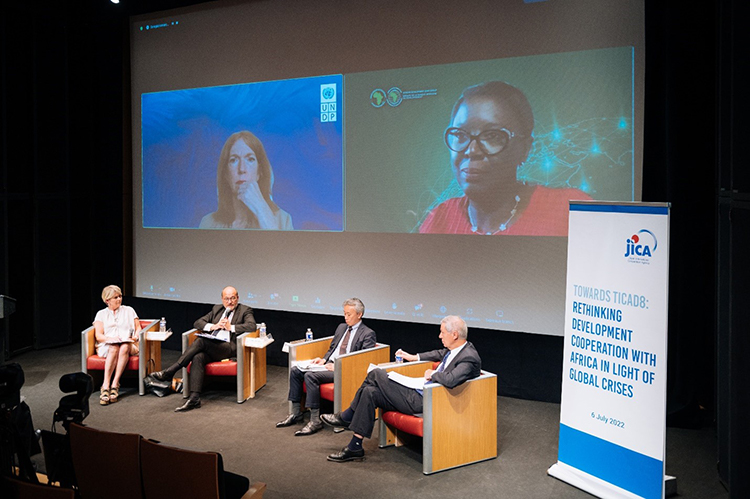
From top left, Ms. Sarah Poole, UNDP Officer-in-charge Regional Director and UNDP's Deputy
Assistant Administrator (online participation), Ms. Yacine Fal, the Acting Vice President,
Regional Development, Integration and Business Delivery of the AfDB. (Online participation)
From bottom left, Ms. Ragnheiður Elín Árnadóttir, Director of Development Centre,
Organization for Economic Co-operation and Development (OECD) (Moderator),
Mr. Rémy Rioux, CEO, Agence Française de Développement (AFD), Mr. KATO Ryuichi,
Vice President of Japan International Cooperation (JICA),
Mr. Jean-Marie Guéhenno, Director of the Kent Global Leadership Program on Conflict Resolution
at Columbia University's School of International and Public Affairs (SIPA)
The answer from our panel of experts-from the African Development Bank (AfDB), Agence Française de Développement (AFD), the United Nations Development Program (UNDP), Columbia University, and JICA-was a clear "yes." In particular, they agreed that three concepts need to be at the heart of development initiatives: resilience, local ownership and regional solidarity.
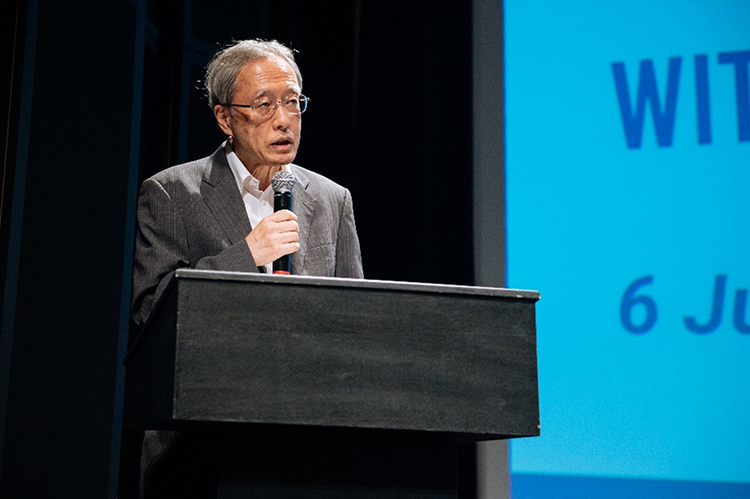
His Excellency Junichi Ihara, Ambassador of Japan to France
To begin the event, His Excellency Junichi Ihara, Ambassador of Japan to France, addressed the audience on the important role TICAD plays in the world. "African Development is central to global stability and prosperity," he began. "With "people-focused" cooperation, supporting local Ownership, and utilizing the Japanese experience as its three key elements, JICA's approach is a perfect match for the TICAD spirit." Setting the tone for the evening's discussion, he emphasized the importance of African ownership and international partnership in achieving lasting positive results and building greater resilience in Africa.
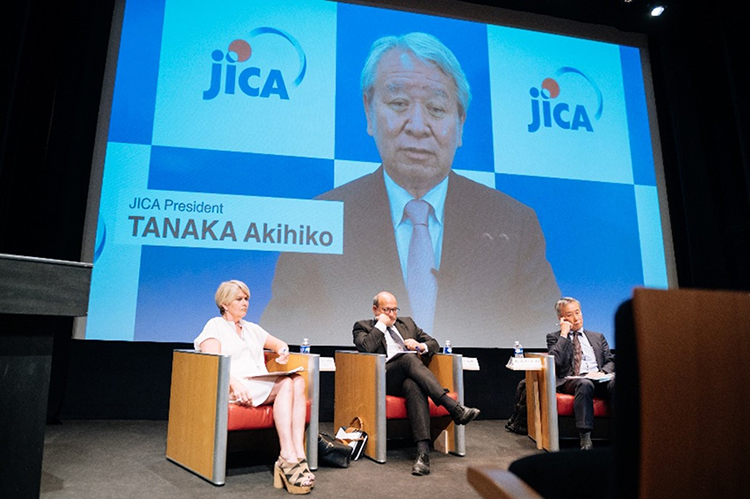
JICA President Dr. Akihiko Tanaka in the screen
Ambassador Ihara was followed by JICA President Dr. Akihiko Tanaka, speaking via video. Dr. Tanaka started by outlining what he believes are the three key concepts for Africa's future: resilience, development and solidarity. "We cannot avoid future crises, nor predict when they will occur. However, we can better prepare for them by enhancing our capacity to withstand external shocks, mitigate damage, and build back better." He then spoke about the importance of human security, ensuring that everyone can live with dignity, free from fear or want. By empowering individuals, organizations and societies, he said, we can achieve these goals so that people can not only survive crises, but emerge from them stronger than before.
Upon opening the panel discussion, Ms. Ragnheiður Elín Árnadóttir, Director of the OECD Development Centre, highlighted the need to support the development of Africa's stronger value chains in order to spur productive transformation and therefore resilience, including through the African Union - OECD "African Investment Observatory (AfIO). Director Árnadóttir, stressed the importance of working together with African countries towards a fair and green energy transition. She introduced the call by President Macky Sall, as well as by AUDA-NEPAD to identify new forms of equal-footing international partnerships in African contexts, which the Development Centre is supporting, particularly through the Development in Transition efforts. Director Árnadóttir welcomed the timely opportunity provided by JICA to discuss these issues.
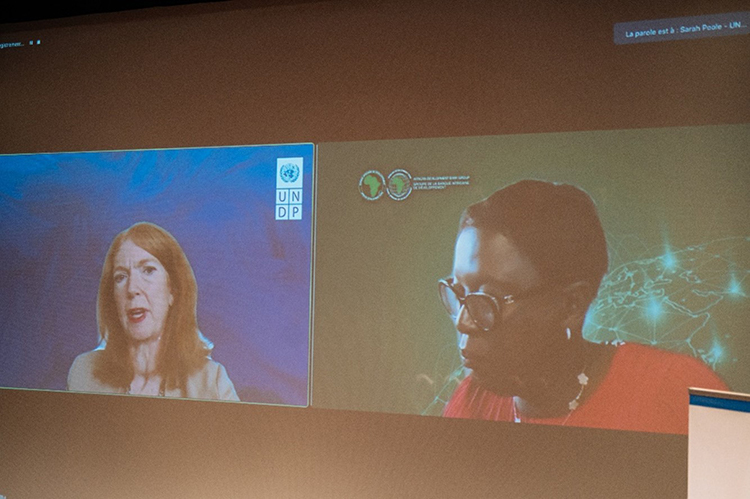
From left, Ms. Sarah Poole, UNDP Officer-in-charge Regional Director and UNDP's Deputy
Assistant Administrator (online participation), Ms. Yacine Fal, the Acting Vice President,
Regional Development, Integration and Business Delivery of the AfDB. (Online participation)
Ms. Yacine Fal, Acting Vice President in charge of Regional Development, Integration and Business Delivery at the AfDB, said the pandemic threatened to reverse a decade of economic growth in Africa. Due to the pandemic, the continent's combined GDP saw its largest drop in 20 years: a loss of roughly USD 165 billion and over 30 million jobs, with 26 million people falling into extreme poverty. As the continent was starting the painful economic recovery from the pandemic, a food crisis was now looming.
The crisis has forced development partners to increase emergency assistance in response to the needs of the African countries, she said. The AfDB, for instance, has introduced a $1.5 billion facility to enhance African food production, promote food security and support countries facing food shortages.
But Ms. Fal added that it was important not to lose sight of long-term goals. Promoting regional integration in supply chains, financial systems and other economic infrastructure would help build resilience to future disruptions, she said. Doing so will require strong partnerships between development agencies and the private sector, including small and medium enterprises (SMEs).
"These are priorities that are shared between the AfDB and Japan," she said. "A lot of our partnership with Japan is based on supporting the development of the private sector."
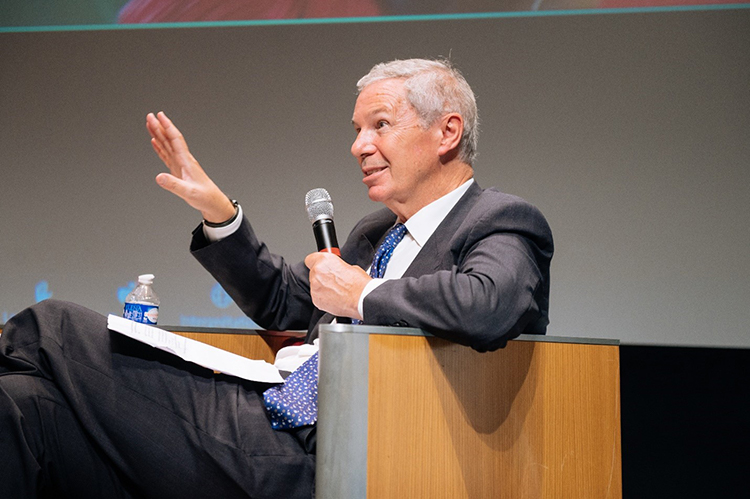
Mr. Jean-Marie Guéhenno, Director of the Kent Global Leadership Program on Conflict Resolution
at Columbia University's School of International and Public Affairs (SIPA)
Mr. Jean-Marie Guéhenno, Director of the Kent Global Leadership Program on Conflict Resolution at Columbia University's School of International and Public Affairs (SIPA), said crises often tested societies' support for peace and for civic institutions. To help prevent conflicts, he said, development partnerships need to focus on keeping the social foundations of peace intact, while simultaneously pursuing long-term resilience-building.
In the realm of peacekeeping, Mr. Guéhenno said it was critical that international organizations ensure that local partners remain at the center of joint operations.
"Too often we substitute rather than support." He said. "That creates what I have sometimes called a peacekeeping trap, where the international community, if it pulls the plug, everything can fall apart."
Ms. Sarah Poole, Officer-in-charge Regional Director and Deputy Assistant Administrator at UNDP, said enhancing climate resilience in Africa, including 8 countries in North Africa and Horn of Africa in the Arab states region, was a top priority for her organization. Temperatures in the region are rising faster than the global average, and more than 40% of the population is already exposed to drought and other climate-induced disasters.
Ms. Poole said economic diversification and investments in alternative energy sources would be crucial drivers of both post-Covid recovery and climate resilience building. Securing universal energy access in Africa will require more than $1.5 trillion in investment between 2018 and 2050.
"Government financing alone, as we know, will not be enough," she said, emphasizing the need for new financial arrangements and public-private partnerships.
Ms. Poole also stressed the importance of promoting inclusive growth in advancing Africa's development, highlighting that the impacts of the Covid-19 pandemic and recent external shocks further widened pre-existing economic inequality, which severely affected people's lives, particularly women and vulnerable groups, across the continent.
UNDP has spearheaded many initiatives that are anchored on the Leaving No One Behind agenda as well as promoting human security on the ground to address the issues of inequalities and vulnerabilities, such as expanding social protection system, empowering young and female entrepreneurs.
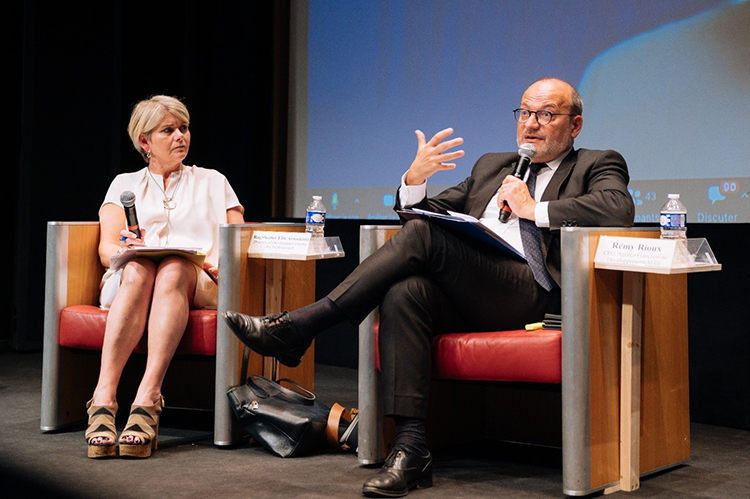
From left, Ms. Ragnheiður Elín Árnadóttir, Director of Development Centre, OECD,
Mr.Rémy Rioux, CEO of Agence Française de Développement (AFD)
Mr. Rémy Rioux, CEO of Agence Française de Développement (AFD), said growing cooperation between public and private financial institutions was encouraging for African development, and that more needed to be done to move "beyond ODA" in its traditional sense.
"ODA is really about leaving no one behind and we need a largely increased capacity to finance sustainable investments," he said.
Mr.Rioux said strengthening institutions in partner countries should be as important for aid agencies as individual projects are.
"Right now," he said, "we're more into measurable impacts that we are accountable to than the long term, patient building of institutions that are then able to provide local solutions."
Changing that, he said, would require "a change in our risk appetite."
Ryuichi Kato, Vice President of Japan International Cooperation Agency (JICA), said promoting African ownership had been crucial to successful JICA-supported projects such as the Coalition for African Rice Development (CARD), which succeeded in doubling Sub-Saharan African rice production in a decade and is helping to mitigate the impact of the Ukraine war-induced food crisis.
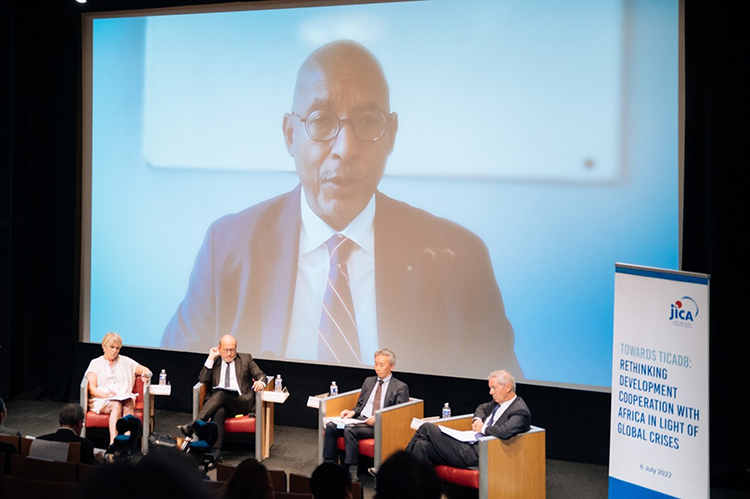
Top in the screen, Dr. Ibrahim Assane Mayaki, the former CEO of AUDA-NEPAD
In addition to the speakers present that evening, a video message was delivered by Dr. Ibrahim Assane Mayaki, formerly the CEO of the African Union Development Agency, who spoke about the need for innovative, but locally based solutions for the crises facing Africa. "Africa needs priorities developed according to the capabilities of each place," he said, "therefore there is a need for place-based policies to tackle regional inequality." The TICAD process and its various partnerships, he continued, is very important to enhancing African resilience through African ownership.
African ownership will be a key theme of the TICAD8, which will be held in Tunisia in August. Mr. Kato said the idea went hand-in-hand with the concept of human security, the people-focused development principle that guides JICA's work. He emphasized that successful development initiatives need to nurture individual talent, national industrial capabilities and regional networks, across both the private and public sectors.
"The key to people-focused development is empowerment at all levels," Mr. Kato said, "starting from individuals, organizations and to societies."
Ms. Árnadóttir concluded by indicating that as mentioned by speakers, updating and adapting development co-operation to support today' multifaceted transitions and transformations also affecting Africa is crucial. She mentioned this event being hopefully the first of many discussions we will have on updating international co-operation and partnerships with Africa. She encouraged participants to attend TICAD8, as well as an event co-organized by AUDA NEPAD, in collaboration with Columbia University, UNECA and the Development Centre on this very topic, back to back with the UN General Assembly (21 September).
Related JICA TICAD8 Side Events
- On Aug.23: Policies for resilience and economic transformation in Africa: setting the agenda for a post-COVID-19 era
- On Aug.23: Revisiting Human Security in Africa
- On Aug.25: Evidence-Based Policy Making (EBPM)to Address the Development Challenge in Africa
- On Aug.26: Promoting Home-Grown Solutions in Africa

